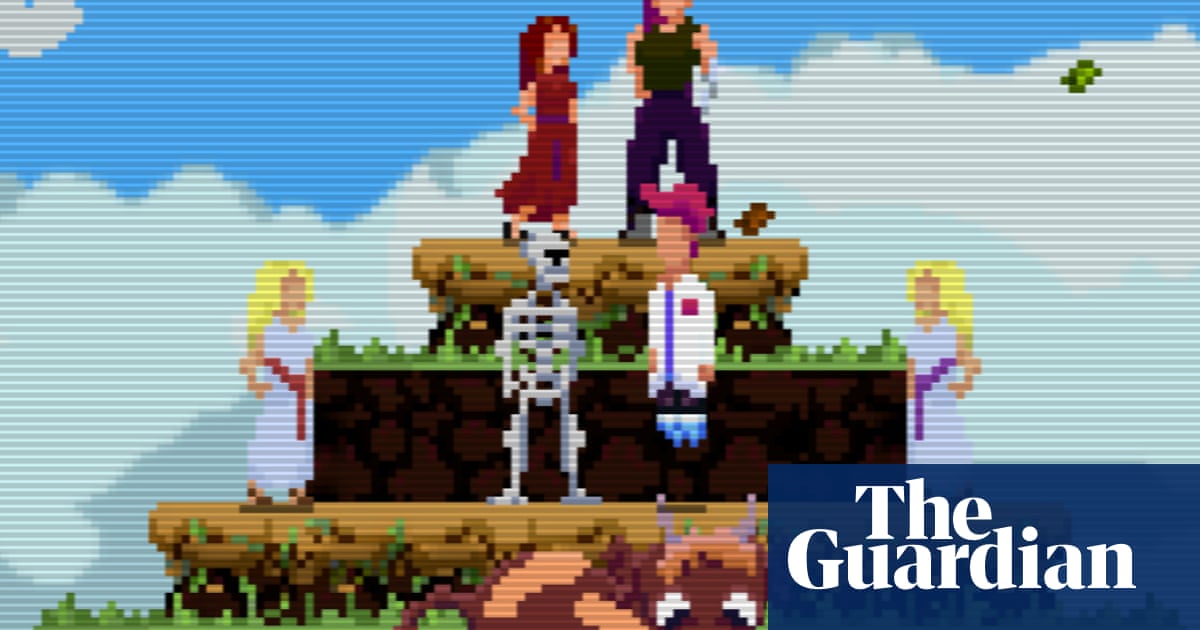The realm of Hus is a rural idyll, where happy villagers wander the marketplace and young shepherdess Ren tends to her flock while her partner, Tyra, fixes up their cottage. It’s almost as though they are all living in a cosy farming simulator, created by a benevolent game developer. But are they? Or is it just an illusion cast by an evil deity, trapping them in a horrifying pixellated facade?
This is the delightfully “meta” setup to Quantum Witch, a pixel art platformer by lone developer Nikki Jay. Heavily inspired by old LucasArts adventures and the legendary Dizzy series on the ZX Spectrum, it’s a comedy game with a serious autobiographical heart. Jay grew up in a right wing religious sect based in the north-east of England with an incredibly enclosed perspective. “They were obsessed with the end of the world,” she says. “They believed it could happen at anytime and that all the wicked people would be destroyed: so I had to be good. It was extremely oppressive.”
In her teens, Jay came out as a lesbian and was immediately disowned by the group. After a period of homelessness, she taught herself coding and got a job as a software engineer – but the need to share her experiences haunted her. “The things I had been through in the past were always churning around my head,” she says. “I thought: ‘I have to do something with this. I can’t just sit on this trauma.’ I knew there were people who had been through the same thing. I wanted to give them a story to identify with and let them know better things are out there.”
At first she considered writing a novel, but found the process horrible. The alternative was games. Growing up in the 1980s, her family had a ZX Spectrum and it was an escape for her. “I retreated into video games, because there I can make the world I want,” she says. “I became obsessed with computer-generated worlds. When I first played Trashman on the Spectrum I thought: ‘This is amazing, this is a whole self-contained, internally consistent world that I can interact with.’ I loved it. It took me away from the horrors I was dealing with in my life.”
In Quantum Witch, Ren discovers that something malignant exists beyond the cloyingly cosy pixel art world she’s been living in and so sets out to discover the truth. On the way, you complete fetch quests, pick flowers for your partner, but ultimately you do have to attack and dethrone God. Although the open Metroidvania-style structure hints at a standard platformer, the game is really a Choose Your Own Adventure-style narrative quest – there are many choices to make during a four-hour playthrough, as well as characters to meet and optional side quests to take on, all of which affect the outcome. “It’s not a platformer it’s a plotformer,” says Jay. “The choices you make form the plot. There are multiple endings, and wherever possible each side quest has multiple endings, too. It is an absolute logistical nightmare.”
Throughout the adventure, the story is filled with the wonderfully daft humour that typified the ZX Spectrum development scene. In the 20-minute demo now available on Steam, you encounter a dancing skeleton who can see through time, a religious group that worships a lamp shade (“We’re not a cult!”) and a marketplace where all the traders resemble famous video game protagonists including a monosyllabic archeologist selling dodgy relics and an odd circular character who tries to sell you uppers to fight the ghosts in your mind. Unsurprisingly, Jay was also a huge fan of the cult Teletext games magazine, Digitiser, known for its surreal humour. She later became friends with its creator Paul Rose who acted as a script consultant on the game. “I had a lot of ideas about the story beats and character development in Quantum Witch, but I’d never written anything as long or complex,” Jay explains. “[Rose] was fantastic at helping me to get all those things marshalled and working together.”
After the joy of Thank Goodness You’re Here, it’s such a pleasure to discover that other developers are taking their cues from the eccentric British humour of the 70s and 1980s. But Quantum Witch isn’t just a pun-riddled comedy quest; it’s a multilayered metaphor about game development, identity and escape, driven by the creator’s own experiences. It’s about what games are supposed to be about: making really big decisions that sometimes end up saving your life.
“I wanted to introduce choice and responsibility which is really the central theme of the story,” says Jay. “A lot of religion is about giving up autonomy to some mystical power that you’ve never seen, heard or met. Over the course of the game, Ren takes that agency back… It’s a queer emancipation story.”







